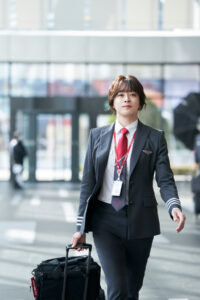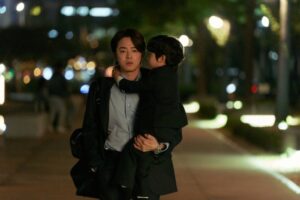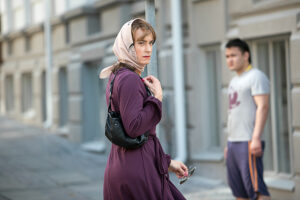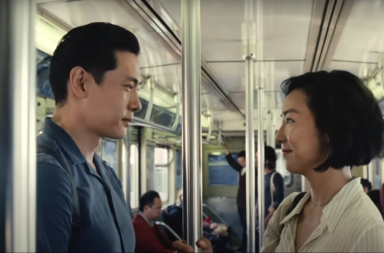
The film Pilot, which follows a male pilot who falls from grace and ends up posing as his sister to continue working in the field, is this summer’s Korean box office hit. The film is adapted from a 2012 Swedish film called Cockpit and stars Jo Jung-seok in his first film since 2019’s Exit, which became the third highest-grossing domestic film of that year. Pilot is quickly following in Exit’s footsteps, having sold 1 million tickets within the first four days of its release to become the fastest movie to hit 1 million sales this summer. Given Pilot’s premise, the film had the potential to provide commentary on Korea’s conservative views toward gender. However, the film ultimately falls flat in its conclusion and fails to push Korea’s conservative population toward a greater understanding of gender equality.
This review contains spoilers.
The plot of Pilot centers on Han Jung-woo (played by Jo Jung-seok) and his reputation. At the start of the film, he is considered a talented, upstanding pilot with a formidable social media presence. However, during a company dinner, Han Jung-woo remarks that the stewardesses working for the airline as beautiful like “a bouquet of flowers.” News of this comment spreads like wildfire, leading to him being canceled online and blacklisted from the industry for his sexist comment. However, the morality behind his transgression is ambiguous, since he made the comment to protect a higher-up who was making more openly misogynist remarks directly prior.
The film eventually reveals the person who catalyzed Han Jung-woo’s downfall by leaking his comment to the media, but the film does not entirely condemn this person, either. By asking the audience to sympathize with both Han Jung-woo and his antagonist, the film refuses to take a moral stance on whose actions were wrong. Instead, it chooses to focus on evoking sympathy through more individualized story arcs and center around Han Jung-woo’s character development above all else — including social commentary on what it is truly like to be a woman in the workplace in Korea.

This individualized focus is only more evident upon comparing the differences between Pilot and Cockpit. In Pilot, Han Jung-woo is portrayed as an arrogant, self-centered man who is so enamored with flying that he pays no attention to his wife’s life or his son’s interests. It is clear from the start that he must undergo intensive character development to reach a satisfactory conclusion to the story. Meanwhile, Cockpit’s main character, Valle Andersson, is laid off from his job — not from a product of cancel culture, but simply due to oversaturation in the pilot profession — and is motivated to continue working to gain joint custody of his son following his divorce. Andersson is still far from perfect; he is painted as a pitiful loser who would ask his doctor for a date right before a rectal exam. Both Han Jung-woo and Valle Andersson come to realize the value of presenting their authentic selves by the end of the film. However, Cockpit has less work to do in terms of character development, leaving more room to explore concepts like affirmative action and gender discrimination without the film feeling overloaded from trying to tackle too much.
Still, Pilot does not completely avoid attempts to address gender discrimination. When Han Jung-woo flies as co-pilot to his friend-cum-colleague Seo Hyeon-seok for the first time since being hired as a woman, Seo Hyeon-seok persistently flirts with Han Jung-woo despite Han Jungwoo’s arguably aggressive rejections. This experience — along with a clubbing scene that shows a man insistently demanding Han Jung-woo go home with him until Han reveals his identity — is cast in a humorous light. While effectively showing the actions of both Seo Hyeon-seok and the man in the club as inappropriate, the reason behind the comedy relies on the dramatic irony of both men hitting on a straight man desperately rejecting male attention lest he be construed as gay. Through these scenes, the film fails to acknowledge how difficult it might be for women who often experience this type of harassment from men but cannot simply take off a wig to make it stop.
In Korean society, a 2023 survey conducted by Embrain Public on behalf of nonprofit organizations Gapjil 119 and the Beautiful Foundation found that South Korean women in the workplace experience inappropriate comments three to four times more frequently than men. Moreover, a 2022 study from Gapjil 119 found that 83% of those who filed reports about experiencing sexual harassment at work reported being treated unfavorably, and only 7.6% of the reports resulted in penalties. These statistics show the unfortunate reality that, in contrast to Han Jung-woo, women who attempt to call out inappropriate behavior are more likely to face retaliation instead of justice.

Meanwhile, Cockpit explicitly confronts gender head-on. Valle’s sister, Maria, is the founder of a feminist action group and often imparts advice — frequently veiled as the typical nagging that occurs between siblings — that allows Valle to process his sexist behavior. When a work-related success is attributed to Maria, Valle as Maria is initially celebrated. A taxi driver even tells Valle that Maria — the pilot — has become a role model for young girls everywhere. Later on, after a truth is revealed that leads Valle as Maria to be condemned, protestors infiltrate the press conference Valle sits in and chant that the mistakes of Valle — in the guise of Maria — do not represent the whole gender. Through this storyline, Cockpit tackles the weight women bear in which they are unable to exist as individuals; instead, their actions are always seen as representative of all women, whether good or bad. This plot point is changed in Pilot such that Han Jung-woo’s actions, from the start to the end, are all attributed to himself. As a result, the main character of Pilot never quite seems to understand the implications of his actions beyond his social circle.
By the end, Pilot presents a watered-down insight into gender discrimination that pales in comparison to 2023’s Barbie, last year’s highest-grossing film in the global box office that openly centers patriarchy and feminism as its themes. However, Barbie notoriously underperformed in South Korea; according to women’s rights activist Shim Hae-in, “women might [have been hesitant] to go watch [Barbie]. The fear of being labeled as a feminist in South Korea is real.” In this case, considering Barbie failed to achieve the success in Korea where Pilot has, maybe this watered-down version is, in fact, the best way to reach Korea’s conservative population.
After all, in a country that has the largest gender wage gap in the developed world and the lowest birth rate across the globe, perhaps very small steps are necessary to be able to move forward at all. Even with Pilot’s weak premise, some Korean men were still enraged about the film, as seen by the gender divide in its reviews on Naver. However, given that a woman in Korea is killed every 1.8 days and there are now over 500 schools and universities embroiled in the current deepfake porn crisis unfolding across the country, it is difficult not to wish Korea’s views could change a little faster for the sake of the women who call the country their home, and that this film could have pushed the envelope to help these women feel more safe and understood.
(Screen Daily, Naver [1][2], The Korea Herald [1][2], The Guardian, NPR, Foreign Policy Magazine, BBC, YouTube. Images via Lotte Entertainment and TrustNordisk)



